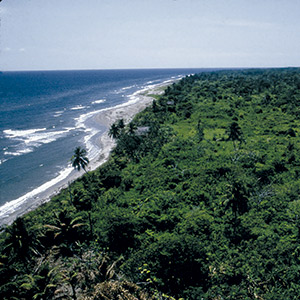CONTRIBUTION
The Foundation for Ecodevelopment and Conservation (FUNDAECO) is a not-for-profit non governmental organization formed in 1990 for the purpose of conserving nature, recuperating degraded environments, recognising and supporting traditional peoples and cultures who live in harmony with their surroundings and promoting a decent, sustainable and equitable way of life for present and future generations of Guatemalans.
From its creation, FUNDAECO has fought to conserve the last remaining forests of the Guatemalan Caribbean, between the borders of Belize and Honduras, in a region with high levels of rural poverty and a complex social and property system. These forests, with their astonishing biological diversity and high levels of endemism, are vital for the ecological connectivity of the Mesoamerican Biological Corridor
FUNDAECO has conducted a multi-pronged campaign for a network of protected areas in the Guatemalan Caribbean, in order to ensure the protection of the region´s biodiversity and combat the poverty affecting its rural populations.
This campaign has included the following strategies: design and designation of areas under the protection of the Legislative Body (two functioning areas and two more under consideration); the purchase of land for protection (9 reserves set up, with a protected area of 7,000 hectares); establishment of Municipal and Community Reserves (6,000 ha protected); promotion of agroecological alternatives (reforesting, organic black pepper, fruit trees, green fertilisers); and the management of state forestry aids for the protection of woodland (15,000 ha). The Foundation has also done pioneering work in favour of the legalisation of indigenous people’s communal lands within protected areas (10,000 ha legalised), in order to stabilise the agricultural frontier and encourage work partnerships. It has championed the participative running of protected areas, such that local agents are brought on board and assigned direct management responsibilities. Parallel with these initiatives, it has engaged in important biological research, including Mesoamerica’s longest running programme for the ringing and monitoring of resident and migratory birds (15 years without interruption; 25,000 birds ringed).

